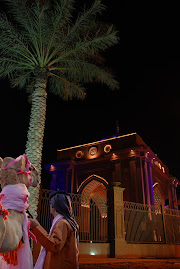 Although I've repeatedly expressed my discontent with using the word feminist as a universal word for female empowerment movements, I nevertheless want to say that a lot of traditional feminists may be unhappy with this column.
Although I've repeatedly expressed my discontent with using the word feminist as a universal word for female empowerment movements, I nevertheless want to say that a lot of traditional feminists may be unhappy with this column.But close observation of the current social situation here in the UAE really does seem to be an anomaly when it comes to female empowerment issues in the Arab world. Of course, this doesn't mean we do not have our fair share of male chauvinists who are unhappy with the current progress of these brilliant Emirati women.
I would like to salute the men who have acknowledged the importance of taking on women as partners in the workplace, political arena, and at home.
Every Great Arab Woman Has a Great Man Somewhere | The National | January 15, 2009
By Tala Al Ramahi
We’ve all heard the proverb: ”Behind every great man is a woman.” Many a female has smiled contentedly at such a profound acknowledgement of her contributions (despite the suggestion that she operates only out of sight of the world). While we, in the UAE, can name our female ambassadors and ministers, our first female judge and other prominent women, we still do not know enough of what they share in common that enabled them to achieve such inspirational success.
This is due, in part, because Emirati women – along with their counterparts in other Arab countries – have risen to prominence and gained significant leadership roles in the political and business arenas in such a relatively short period of time. And while there is a considerable amount of research that could be done on these women, their own declarations and close scrutiny of their life (when possible) can provide us with some insight.
In an interview published in The National in December, Dr Hissa Al Otaiba, the UAE’s newly appointed ambassador to Spain, explained that her decision to take on her new role, which would lead to regular separations from her husband (he just been appointed ambassador to Italy) was influenced by the support she received from her family. “My husband was very encouraging, too. He didn’t want to say it because he wanted me to take the decision, but I felt it,” Dr Otaiba said. She also said that she drew inspiration from her late father, Abdulla Ahmed al Otaiba, who served as vice president of the National Consultative Council.
Earlier this week, Sheikha Manal bint Mohammed Al Maktoum, the president of the Dubai Women Establishment, presented the keynote speech on the first day of the Arab Women Leadership Forum to a keen audience of young Emirati women, while her father, Sheikh Mohammed bin Rashid, the Vice-President of the UAE and Ruler of Dubai, sat comfortably to one side as she took the spotlight in front of female dignitaries and renowned scholars.
The Emirati woman’s rapid journey to empowerment is something of an anomaly in this region. For a start, it is our male leaders who are promoting female emancipation to allow women to become partners of progress in the country. That said, culture does not change overnight, and social customs still hold back many a woman from full participation in many fields, even though such measures have the backing from the highest authorities.
Despite the numerous success stories, the UAE is a culture that is still fairly conservative; many Emirati women have difficulty travelling abroad for their education even if they gain admission to the most reputable institutions, while some are stopped (culturally, not legally) from taking jobs in “controversial” professions, particularly those that are male-dominated (civil engineering, for instance), or where the woman is too publicly prominent, such as television reporting.
Such decisions are usually made (or at least, vetoed) by the woman’s father, or husband if she is married. The men risk social criticism, at times, if they decide to allow their daughters and wives to undertake pioneering, albeit unconventional, courses of action. It is, however, infinitely more acceptable in this country for a woman to transform social norms with the backing of the male-figures in her life, instead of rebelling and challenging their authority.
A recent investigative field study of women leaders in neighbouring Oman set out to discover the common features in the lives of such prominent women. It was found that almost all of them had influential mentors and an extremely supportive parent – in the majority of cases it was her father. It takes, after all, a self-assured man to be comfortable, even proud, of his wife or daughter’s success.
A mural by the Emirati artist, Hind bin Demaithan, entitled “Competition or Completion” features an Emirati man and woman, each pulling on opposite sides of the scales of justice. But I believe it is fruitless to regard the rise and success of women as a “battle of the sexes”. Thankfully, for the most part in this country we do not have to view the situation in those kind of terms. After all, a successful woman not only helps boost the prosperity of her family, she also contributes to the development goals of the nation. It seems (for now at least) that “behind every successful Arab woman, is an extremely supportive man” – and one who is confident enough to know that the success of his wife (or daughter) is a blessing, not a threat.


No comments:
Post a Comment